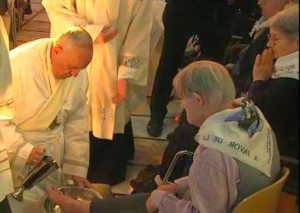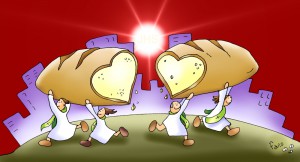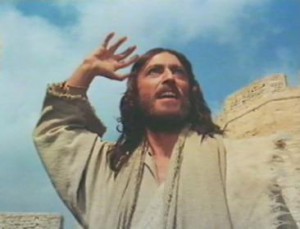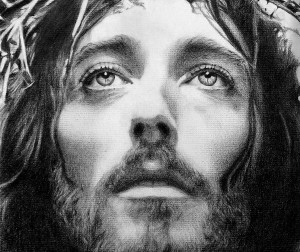A commentary on Mk 10, 46-52 (Sunday XXX O.T., October 25th 2015
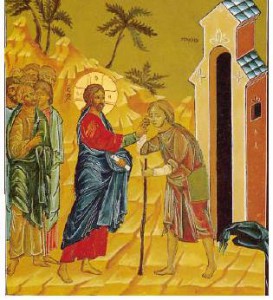 On his way up to Jerusalem, Jesus arrived at Jerico, a town with a long history in Israel. In this town, Mark places an interesting dialogue, quite different in nature from de one He had with the sons of Zebedee that we read last Sunday.
On his way up to Jerusalem, Jesus arrived at Jerico, a town with a long history in Israel. In this town, Mark places an interesting dialogue, quite different in nature from de one He had with the sons of Zebedee that we read last Sunday.
While the sons of Zebedee put up the question of power and their ranking as followers of Jesus (showing how little they had understood), the son of Timeo, Bartimeo, stands before de “son of David” as he really is: a blind man who wishes to see, somebody who has lost the meaning and feels lost in life.
Let us not forget that, in Marks’s intention, the son of Timeo, as the sons of the Zebedee, real persons as they might be, are brought here, to this story, as personalities that represent all of us, disciples of any time, who search for la light that sometimes we confuse with the glimpses of money, power, prestige or any other blinkering reality.
Let us stop a bit on this story and the dialogue between Bartimeo and Jesus, bearing in mind that somehow we are also taking part in it:
1.- At the road side, out of the town. Bartimeo was seating at the road’s side, marginalized from social life, unable to be among the human community.
Do we know in our experience such people as Bartimeo, people marginalized, not taken into consideration, despised because of a physical defect or otherwise? Remember that in our Christian communities there should not be any one discriminated.
But it may happen that we are the marginalized ones; it may happen that ourselves suffer despise in our own family, in the working place…or we may experience problems that seem bigger than what we can cope with. In that case, we should remain in contemplation of this Bartimeo and try to follow his steps as “blind” disciples.
2.- He shouts: “Son of David, have mercy on mi”. What a marvellous prayer! We all are in need, in one or other moment in life, of mercy, understanding, forgiveness… Only a stupid and false pride can lead us to think that we do not need God’s and our neighbour’s mercy. Bartimeo is teaching us one of the best prayers ever: “Lord, have mercy on me, help me, since I alone cannot overcome my troubles”. It’s a prayer to say with humility but without feeling of shame or false vanity. Somebody has said that never a human being is greater than when he kneels down. The opposite is just lie or hypocrisy.
3.- “What do you want me to do for you? To see again”. Physical blindness is a drama, but many blind people show that it’s not the end of the world and that worse than physical blindness y the spiritual one, to which Mark refers in this story; the blindness of so many people unable to understand God’s love, closed up in their own world of self-content and “self-reference”. This is also a precious prayer: “Lord, let me see your light, so that I may understand your love”.
4.- Your faith has saved you. The Italian theologian Bruno Forte says: “ Following a suggestive medieval etymology, “to believe (“credere”) means to give your heart (“cor-dare”), to put your heart into the hands of Somebody else… To believe is to trust in Somebody, say “yes” to his call, to put our own life in His hands, so that He is the Unique and true Lord” (B. Forte, Piccola introduzione alla fede, San Paolo, 1992, p. 16).
This faith-communion with the Other One is always healing, because it helps a person to come out of herself, out of her self-centrality and stablish links with other persons; that link becomes a sign and a means to be in touch with Reality ns, in the end, with God, the Reality that is backing all other reality. That link makes us true to ourselves and to other, healing our loneliness and vulnerability.
As I celebrate the Eucharist today, I enter into communion with the Son of David and, as the blind man, I pray: Lord Jesus, have pity on me; make me see and understand your great love, that love that gives colour, truthfulness and sense to what I am an live.
Fr. Antonio Villarino
Roma




